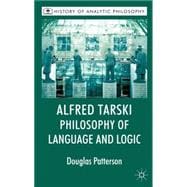
What is included with this book?
| Series Editor's Foreword | p. viii |
| Introduction | p. 1 |
| Expressive and representational semantics | p. 1 |
| The received view | p. 4 |
| Themes | p. 7 |
| Intuitionistic Formalism | p. 12 |
| What was Intuitionistic Formalism? | p. 12 |
| A puzzle about concepts and definitions | p. 12 |
| Tarski, Lesniewski and Intuitionistic Formalism | p. 16 |
| Formalism | p. 19 |
| Lesniewski | p. 20 |
| Lesniewski's early work | p. 20 |
| Lesniewski's later work | p. 25 |
| Kotarbinski | p. 31 |
| Tarski in context | p. 37 |
| The axiomatic method | p. 37 |
| Monism vs tolerance | p. 41 |
| Five doctrines | p. 43 |
| Tarski's project | p. 49 |
| Tarski as Intuitionistic Formalist | p. 53 |
| The early metamathematical works | p. 53 |
| Axiomatizing consequence | p. 53 |
| Relativization to a deductive science | p. 55 |
| Explicit definition | p. 62 |
| Defining definition | p. 63 |
| Two conceptions of definition | p. 65 |
| Padoa's method | p. 67 |
| Categoricity and completeness of terms | p. 70 |
| Provable monotransformability | p. 70 |
| Absolute monotransformability | p. 76 |
| Theory and concept | p. 80 |
| Semantics | p. 84 |
| Philosophical resistance | p. 85 |
| The quantifier | p. 86 |
| Paradox | p. 89 |
| Mathematical acceptance | p. 91 |
| Intuitionistic Formalism in "On Definable Sets" | p. 94 |
| The intuitive notion of definability | p. 95 |
| Defining definable sets vs defining "Defines" | p. 100 |
| Truth | p. 108 |
| Convention T | p. 109 |
| Terminological notes | p. 109 |
| Truth in the Lvov-Warsaw school | p. 111 |
| Semantic concepts in a mathematical theory | p. 114 |
| T-sentences | p. 117 |
| Tarski's definitions | p. 122 |
| Truth for the language of the calculus of classes | p. 122 |
| Higher order and polyadicity | p. 124 |
| Domain relativization and consequence | p. 128 |
| Evaluating Tarski's account | p. 129 |
| Familiar questions | p. 129 |
| Tarskian definitions and Tarski's "theory" | p. 133 |
| Reduction and physicalism | p. 138 |
| Correspondence and deflationism | p. 140 |
| Indefinability and Inconsistency | p. 144 |
| Indefinability | p. 145 |
| Indefinability before 1931 | p. 145 |
| Theorem I: textual issues | p. 147 |
| Theorem I and Intuitionistic Formalism | p. 155 |
| Axiomatic semantics | p. 158 |
| Inconsistency in everyday language | p. 160 |
| Inconsistent Kotarbinskian conventions | p. 162 |
| Tarski after Kotarbinski | p. 166 |
| Transitions: 1933-1935 | p. 169 |
| The 1935 postscript | p. 170 |
| Carnap on analyticity and truth | p. 174 |
| The establishment of scientific semantics | p. 179 |
| Logical Consequence | p. 181 |
| Tarski's definition | p. 182 |
| Synopsis | p. 182 |
| Objections to Tarski's account | p. 185 |
| Consequence in Logical Syntax | p. 187 |
| L-consequence and condition F | p. 187 |
| Tractarianism in the Vienna circle | p. 191 |
| The overgeneration problem and domain variation | p. 194 |
| Domain variation | p. 194 |
| Consequence in Gödel's completeness theorem | p. 198 |
| Tarski's fixed domain | p. 201 |
| The modality problem and "Tarski's Fallacy" | p. 203 |
| Modalities | p. 204 |
| Consequence and truth | p. 206 |
| Tarski's "must" | p. 208 |
| The formality problem and the logical constants | p. 209 |
| Constant and consequence | p. 209 |
| Anachronistic readings | p. 211 |
| Carnap on formality | p. 213 |
| The ¿-rule and Gödel sentences | p. 214 |
| Antitractarianism and the nature of logic | p. 215 |
| Evaluating Tarski's account | p. 219 |
| The analytic problem | p. 219 |
| Eliminating transformation rules | p. 221 |
| Epistemic and generality conceptions of logic | p. 223 |
| Conclusion | p. 227 |
| Paris 1935 and the reception of semantics | p. 227 |
| Final remarks | p. 232 |
| Notes | p. 234 |
| Bibliography | p. 249 |
| Index | p. 260 |
| Table of Contents provided by Ingram. All Rights Reserved. |
The New copy of this book will include any supplemental materials advertised. Please check the title of the book to determine if it should include any access cards, study guides, lab manuals, CDs, etc.
The Used, Rental and eBook copies of this book are not guaranteed to include any supplemental materials. Typically, only the book itself is included. This is true even if the title states it includes any access cards, study guides, lab manuals, CDs, etc.